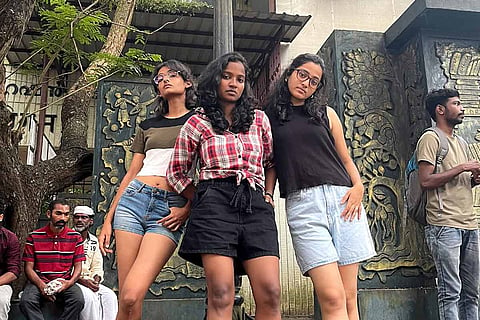

A group of women students from Government Medical College, Kozhikode in Kerala (Calicut Medical College) have started a photo series to tackle misogyny that places the blame on women’s clothing for sexual harassment. “Don’t tag me ‘shameless’ or ‘asking for it’ just because you don’t seem to have control over your thoughts or your body,” reads the caption under an Instagram photo of Ancy Shaju, a student of the Calicut Medical College (CMC). The Instagram page of Women in Campus (WINCA), a student initiative to celebrate womanhood and address the issues that women face in CMC, also features the photos of four other students, confidently flaunting shorts, crop tops and sheer fabric. The photos are part of a series titled ‘Not Asking For It,’ and the women featured in it are students of CMC.
The photo series questions the regressive logic that links clothing with sexual harassment. “In our society, women are blamed for wearing revealing clothes, but men are not taught to stop sexualising them. Women are asked to cover themselves from head to toe, but men are not taught to respect women’s consent,” a post on WINCA’s Instagram read.
The first instalment of the series is titled ‘On the Streets’ and was shot on Kozhikode’s busiest market on SM Street and at a bus stop near CMC. The students who participated include Radhika Deeju, Ancy Shaju, Sreenima, Sreelakshmi Prakash and Fiona Joseph. The coming instalments will be shot within their campus and in other public spaces. Speaking to TNM, Fiona Joseph said that the movement was initiated to break the stereotypes associated with women's dressing.
The protest was born out of their outrage at a remark made by a Sessions court judge in Kozhikode, while granting bail to writer Civic Chandran in an alleged case of sexual harassment. The judge had said that the sexual harassment accusation will not stand as the complainant was dressed in a sexually provocative manner. The remark drew flak for espousing a misogynist attitude towards survivors of sexual harassment that generations of feminists have fought against. According to Fiona, the students decided to hold a photoshoot at SM market as they felt that a protest restricted to a simple social media post was not enough. “When we started the shoot outside our college, a person approached us and asked whether we don't have parents and said that we were tainting Indian culture. Even in the market some people were staring at us, including women. There were a lot of comments questioning our culture and upbringing,” she recalled.
“What Were You Wearing?” an exhibition held at the UN Headquarters in December, organised in partnership by civil rights organisation Rise and the UN Spotlight Initiative, displayed the outfits worn by sexual assault survivors at the time of the attack to “bring attention to the barriers of justice faced by global survivors of sexual violence.” The exhibition makes the unambiguous statement that it is not the survivor’s clothing, but the perpetrators that are the cause for the violence. Similar exhibitions have questioned this blaming tactic.
Fiona said that the campaign should make people realise that what they wear today is not a reflection of Indian culture and that clothing trends have changed to suit the times. “Can you see anyone wearing chatta-mundu now?” she asked.
[All pictures by Rijas Siddhik and Austin J]